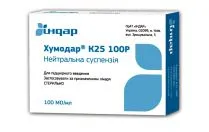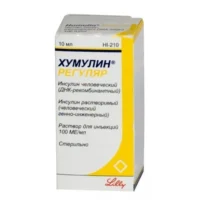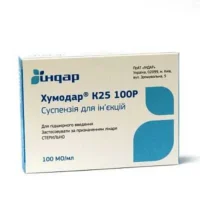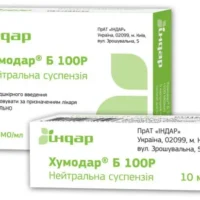Description
Chumodar K (insulin) 25 100R suspension 100 OD/ml. 5 ml. №1 vial
Ingredients:
Chumodar K contains insulin as the active ingredient in a suspension form. Each milliliter of the suspension contains 100 units of regular insulin.
Dosage:
Chumodar K is typically administered subcutaneously once daily. The dosage may vary based on individual needs and should be determined by a healthcare provider.
Indications:
Chumodar K is indicated for the treatment of diabetes mellitus to control high blood sugar. It helps regulate glucose levels in the body by facilitating the uptake of glucose into cells for energy production.
Contraindications:
Chumodar K is contraindicated in patients with hypoglycemia or hypersensitivity to insulin or any of the components in the formulation. It should not be used during episodes of low blood sugar.
Directions:
Before each use, inspect the vial for any particles or discoloration. Administer the prescribed dose subcutaneously, rotating injection sites to prevent lipodystrophy. Follow the healthcare provider’s instructions carefully.
Scientific Evidence:
Studies have shown that insulin therapy, such as Chumodar K, is effective in managing diabetes and preventing complications associated with uncontrolled blood sugar levels. Research by Zheng et al. (2018) demonstrated the benefits of insulin in improving glycemic control and reducing the risk of diabetic complications.
Additional Information:
It is essential to monitor blood sugar levels regularly while using Chumodar K to adjust the dosage as needed. Store the vial in the refrigerator between 36-46°F (2-8°C) and avoid freezing. Keep it out of reach of children.
Pharmacologically, insulin works by promoting the uptake of glucose from the bloodstream into cells, where it is utilized for energy production. This helps lower blood sugar levels and prevents hyperglycemia. Insulin also inhibits the production of glucose in the liver, further contributing to glucose control.
Clinical trials have shown that insulin therapy is crucial in managing diabetes and reducing the risk of complications such as cardiovascular disease, neuropathy, and retinopathy. Compared to oral antidiabetic medications, insulin is often more effective in controlling blood sugar levels, especially in advanced stages of diabetes.





